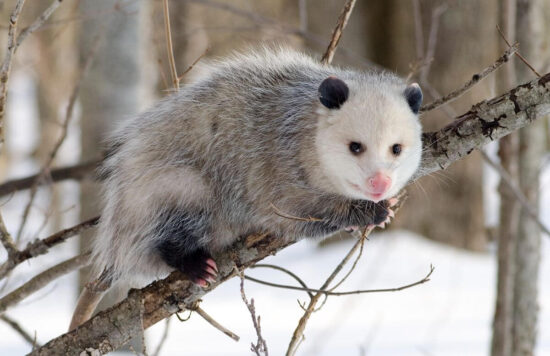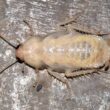Opossums might look scary with their rat-like tails and sharp teeth, but how dangerous are they really? These common backyard visitors cause a lot of worry for homeowners who find them digging through trash or living in attics. The truth is that opossums are much less dangerous than most people think.
While they can carry diseases and cause property damage, they rarely attack humans or pets. This guide covers everything you need to know about opossum safety, from disease risks to dealing with them on your property.
Understanding Opossum Behavior
When people wonder if opossums are dangerous, they often picture aggressive, rabid creatures with sharp teeth. The reality is much different. Opossums are naturally shy animals that prefer to avoid any type of confrontation. These nocturnal marsupials spend their nights searching for food and will usually waddle away when they encounter humans.
Opossums have terrible eyesight and poor hearing, but they make up for it with an incredible sense of smell. They move slowly and carefully through yards and neighborhoods, looking for easy meals. Their main goal is finding food, not picking fights with people or pets.
Are Opossums Dangerous?
The simple answer is no. Opossums rarely show aggression toward humans. When you encounter an opossum, it might hiss, growl, or show its 50 sharp teeth, but this is all for show. They’re trying to scare you away so they can escape. Think of it like a tiny dog barking at a much bigger dog. It’s all about bluffing.
Most people who worry if opossums are dangerous don’t realize these animals will only bite as an absolute last resort. They have to be cornered with no escape route before they’ll actually attack. Even then, they’d rather play dead than fight. Attacks on humans are so rare that most wildlife experts consider them basically harmless to people.
Do Opossums Attack Pets?
Your pets are generally safe around opossums. Dogs are actually more likely to hurt or kill an opossum than the other way around. When it comes to cats, adult opossums and felines usually show mutual respect and avoid each other. Sometimes cats might kill very young, small opossums, but adult opossums won’t go after your cat.
Chickens are a different story. While opossums rarely attack adult chickens because they would put up too much of a fight, they will eat eggs and might go after chicks if they get the chance. Pet food left outside can attract opossums, which might lead to encounters with your pets, but serious injuries from these encounters are uncommon.
The Truth About Opossums and Rabies
Here’s some great news for anyone concerned about whether opossums are dangerous: they almost never carry rabies. Their body temperature is too low for the rabies virus to survive and multiply. While any mammal can technically get rabies, opossums have one of the lowest rates of rabies infection among all wild animals.
This makes opossums much safer to have around than raccoons, bats, skunks, or foxes, which carry rabies more frequently. So if you see an opossum acting strange, drooling, or swaying, it’s probably not rabid. It’s likely just scared and getting ready to play dead.
Diseases Opossums Can Carry
While rabies isn’t a big concern, opossums can carry other diseases. The most common one is leptospirosis, a bacterial infection spread through their urine. This disease can contaminate soil, water bowls, and puddles in your yard. Some opossums also carry tuberculosis, though this is less common.
Opossums often have parasites like fleas, ticks, and mites. These tiny pests can jump from opossums to your pets or even to you. They can also spread salmonella if they get into garbage or pet food. Horse owners need to be especially careful, as opossum droppings can contain a parasite that causes EPM, a serious disease that affects horses’ nervous systems.
When Opossums Bite: Risk and Treatment
Understanding if opossums are dangerous includes knowing what to do if you get bitten. While bites are extremely rare, they can happen if you try to handle an opossum or accidentally corner one. Their 50 teeth can cause painful puncture wounds that need proper care.
If an opossum bites you, wash the wound immediately with soap and warm water. Apply an antiseptic and cover it with a clean bandage. You should see a doctor even if the bite seems minor. The doctor might prescribe antibiotics to prevent infection, since wild animal bites can introduce bacteria into the wound. Make sure your tetanus shot is up to date too.
The “Playing Dead” Defense Mechanism
Playing possum isn’t just a cute phrase. It’s a real thing opossums do when they’re terrified. This behavior, called thanatosis, is completely involuntary. The opossum can’t control it any more than you can control fainting. When extremely frightened, their body goes into shock.
During this state, the opossum becomes rigid, its breathing slows way down, and it releases a terrible smell from its anal glands. It might drool, let its tongue hang out, and even poop or pee. This can last anywhere from a few minutes to several hours. The opossum looks and smells completely dead, which usually makes predators lose interest and leave.
Why Opossums Are Less Dangerous Than Other Wildlife
When comparing if opossums are dangerous to other common wildlife, opossums are actually some of the safest animals to have in your yard. Unlike raccoons, they’re not aggressive and don’t actively defend territory. Unlike skunks, they won’t spray you with a horrible smell that lasts for days. Unlike rats, they don’t multiply rapidly and infest homes in large numbers.
Opossums are also less likely to cause serious property damage compared to squirrels or raccoons. They don’t have the strong, constantly growing teeth that rodents have, so they cause less gnawing damage. They’re basically nature’s cleanup crew, eating dead animals, insects, and overripe fruit that would otherwise rot in your yard.
Property Damage from Opossums
While people worry if opossums are dangerous to humans, they should also consider property damage. Opossums can cause problems when they move into attics, sheds, or under porches. In attics, they tear up insulation to make nests and use it as a bathroom. Their droppings are large and smelly, and can soak through ceiling materials, causing stains and odors.
Opossums might also damage electrical wires by chewing on them, though not as badly as rodents do. They can tear up air ducts, especially if they get trapped. Outside, they might knock over garbage cans, dig in gardens, and leave droppings on patios and walkways. The damage is usually more of a messy nuisance than a serious structural problem.
When Opossums Become a Safety Concern
There are certain situations where you need to take opossums more seriously. If an opossum seems sick, walks in circles during the day, or appears disoriented, stay away and call animal control. While rabies is rare, other diseases can make opossums act abnormally.
Opossums become more concerning if they lose their fear of humans and start approaching people for food. This usually happens when people feed them. A mother opossum protecting babies might also be more likely to stand her ground instead of running away. If you find an opossum in your house, especially in living areas rather than the attic, you need professional help to remove it safely.
Preventing Opossum Problems
The best way to avoid wondering if opossums are dangerous is to prevent encounters in the first place. Start by securing your garbage cans with tight lids and bringing pet food inside at night. Clean up fallen fruit from trees and don’t leave food scraps in compost piles without covering them properly.
Block access points to your home by installing mesh over vents and chimney caps. Trim tree branches away from your roof so opossums can’t use them as bridges. Motion sensor lights and sprinklers can scare opossums away from your yard. Keep your yard clean and remove brush piles, wood stacks, and other places where opossums might hide during the day.
When to Call a Professional
Sometimes you need expert help to handle opossum problems safely. Call a professional wildlife removal service if you have opossums living in your attic or walls, if you see baby opossums (their mother is probably nearby), or if an opossum appears sick or injured. Don’t try to trap and relocate opossums yourself, as this might be illegal in your area and can be dangerous.
Professionals have the right equipment and knowledge to remove opossums humanely without putting you at risk. They can also identify and seal entry points to prevent future problems. The cost of professional removal is worth avoiding potential bites, scratches, or disease exposure.
Dangerous Opossum Myths vs. Reality
Many people believe myths that make them think opossums are more dangerous than they really are. One big myth is that opossums are aggressive and will attack unprovoked. Reality: they’re actually timid and only defend themselves when they have no other choice.
Another myth claims opossums eat thousands of ticks each season, making them valuable for disease prevention. Recent research has actually questioned this claim, finding little evidence of ticks in wild opossums’ stomachs. While people once thought a single opossum could eat 5,000 ticks per year, scientists now doubt this is true. The myth about opossums hanging by their tails is also false. They can’t support their body weight this way for more than a few seconds.
Living Safely with Opossums
After learning if are opossums are dangerous, most people realize these animals pose very little threat. You can coexist peacefully with opossums by following simple safety rules. Never try to pet or handle them, even if they seem friendly. Teach children to admire them from a distance and never corner them.
If you see an opossum in your yard, just give it space and time to leave on its own. They’re usually just passing through looking for food. Keep your pets’ vaccinations current and supervise small pets when they’re outside at night. Remember that opossums are beneficial animals that eat pests, carrion, and rotting fruit. They’re much more afraid of you than you need to be of them. With basic precautions, opossums can be interesting nighttime visitors rather than dangerous pests.


